- Home
- P. D. James
Shroud for a Nightingale Page 7
Shroud for a Nightingale Read online
Page 7
Dalgliesh had been told, and more than once. The absence of the Matron seemed to be a fact which everyone he had met, however briefly, had found it necessary to mention, explain or regret. But Sister Rolfe was the first to make a snide reference to the fact that it gave Miss Taylor an alibi, at least for the time of Fallon’s death.
“And the rest of the students?”
“They’re in the small lecture room on the floor below. Sister Gearing, our clinical instructor, is taking them for a private study period. I don’t suppose they’re doing much reading. It would have been better to set them something more active but it’s not easy at a moment’s notice. Will you see them there?”
“No, later. And in the demonstration room where Nurse Pearce died.”
She glanced at him and then turned her eyes away quickly, but not so quickly that he missed the look of surprise and, he thought, disapproval. She had expected him to show more sensitivity, more consideration. The demonstration room had not been used since Nurse Pearce’s death. To interview the students there so soon after this second tragedy would reinforce memory with fresh horror. If any of them were ready to be unnerved, this might do it and he had never considered using any other room. Sister Rolfe, he thought, was like all the rest of them. They wanted their murderers caught but only by the most gentlemanly means. They wanted them punished, but only if the punishment did not outrage their own sensibility.
Dalgliesh asked: “How is this place locked at night?”
“Sister Brumfett, Sister Gearing and myself take responsibility for a week at a time. It’s Gearing’s turn this week. We’re the only three Sisters who are resident here. We lock and bolt the front door and the kitchen door at eleven o’clock promptly. There’s a small side door with a Yale lock and an inside bolt. If any student or member of the staff has a late pass she is issued with a key to that door and bolts it when she comes in. Sisters have a key in their possession permanently. There’s only one other door and that leads from Matron’s flat on the third floor. She has a private staircase and, of course, her own key. Apart from that, there are the fire escape doors, but they are all kept locked on the inside. The place wouldn’t be difficult to break into. I imagine that few institutions are. But we’ve never had a burglar so far as I know. Incidentally, there’s a pane of glass out in the conservatory. Alderman Kealey, the Vice-Chairman, seems to think that Fallon’s murderer got in that way. He’s a great man for finding comfortable explanations for all life’s embarrassing problems. It looks to me as if the pane blew in with the wind, but you’ll no doubt form your own opinion.”
She’s talking too much, he thought. Loquacity was one of the commonest reactions to shock or nervousness and one which any interrogating officer made the most of. Tomorrow she would despise herself for it, and become that much more difficult, that much less co-operative. In the meantime she was telling him more than she realized.
The broken pane would, of course, have to be looked at, the woodwork examined for marks of entry. But he thought it unlikely that Nurse Fallon’s death had been the work of any intruder. He asked: “How many people slept here last night?”
“Brumfett, Gearing and myself. Brumfett was out for part of the night. I understand she was recalled to the ward by Mr. Courtney-Briggs. Miss Collins was here. She’s the housekeeper. And there were five student nurses: Nurse Dakers, the Burt twins, Nurse Goodale and Nurse Pardoe. And Fallon slept here of course. That is, if Fallon had time to sleep! Incidentally, her bedside light was on all night. The Burt twins were up brewing cocoa shortly after two and nearly took a cup in to Fallon. If they’d done so you might have got a clearer idea of the time of death. But it occurred to them that she might have fallen asleep with the light on and wouldn’t exactly welcome being woken, even to the sight and smell of cocoa. The twins’ invariable solace is food and drink, but at least they’ve lived long enough to realize that not everyone shares their preoccupation and that Fallon, in particular, might prefer sleep and privacy to cocoa and company.”
“I shall be seeing the Burt twins. What about the hospital grounds? Are they left open at night?”
“There’s always a porter on duty at the front lodge. The main gates aren’t locked because of the accident ambulances but he keeps an eye on anyone else who comes in or leaves. Nightingale House is much closer to the rear entrance to the grounds, but we don’t usually go that way by foot because the path is ill-lit and rather frightening. Besides, it leads into Winchester Road which is almost two miles from the main part of the town. The back gate is locked at dusk summer and winter by one of the porters but all the Sisters and Matron have keys.”
“And the nurses with late passes?”
“They’re expected to use the front gate and walk along the main path which skirts the hospital. There’s a much shorter cut through the trees which we use in the daytime—it’s only about 200 yards—but not many people choose to come that way at night. I daresay Mr. Hudson, he’s the Hospital Secretary, can let you have a plan of the grounds and of Nightingale House. Incidentally, he and the Vice-Chairman are waiting for you now in the library. The Chairman, Sir Marcus Cohen, is in Israel. Even so, it’s quite a reception committee. Even Mr. Courtney-Briggs has deferred his out-patient session to welcome the Yard to Nightingale House.”
“Then,” said Dalgliesh, “perhaps you’ll be good enough to let them know that I’ll be with them shortly.”
It was a dismissal. Sergeant Masterson, as if to soften it, said suddenly and loudly: “Sister Rolfe has been very helpful.”
The woman gave a guttural snort of derision.
“Helping the police! Isn’t there a sinister connotation about that phrase? Anyway, I don’t think I can be particularly helpful. I didn’t kill either of them. And last night I was at a film at the new arts cinema here. They’re showing an Antonioni series. This week it’s L’Avventura. I didn’t get in until just before eleven and went straight to bed. I didn’t even see Fallon.”
Dalgliesh asked: “Did you go to the cinema alone?”
Sister Rolfe hesitated for a second and said curtly: “Yes.”
Dalgliesh recognized with weary resignation the first lie and wondered how many more, important and unimportant, would be spoken before the investigation was complete. But this wasn’t the time to interrogate Sister Rolfe. She wasn’t going to be an easy witness. She had answered his questions fully but with undisguised resentment. He wasn’t sure whether it was he or his job which she disliked, or whether any man would have provoked this tone of angry contempt. Her angry face matched her personality, rebarbative and defensive. It was strong and intelligent but without softness or feminity. The deep-set and very dark eyes might have been attractive but they were set under a pair of perfectly straight black eyebrows, so dark and bushy that they gave to the face a faint suggestion of deformity. Her nose was large and open-pored, her lips a thin uncompromising line. It was the face of a woman who has never learnt to come to terms with life, and had, perhaps, given up trying. He thought suddenly that, if she proved to be a murderess and her photograph were at last published, other women, avidly searching that uncompromising mask for the marks of depravity, would profess themselves unsurprised. Suddenly he felt sorry for her with a mixture of irritation and compassion one might feel for the inadequate or the physically deformed. He turned quickly away so that she should not catch that sudden spasm of pity. To her it would, he knew, be the ultimate insult. And when he turned again to thank her formally for her help, he saw that she had gone.
3
Sergeant Charles Masterson was six feet three inches tall and broad-shouldered. He carried his bulk easily and all his movements were surprisingly controlled and precise for such an assertively masculine and heavy man. He was generally considered handsome, particularly by himself, and with his strong face, sensual lips and hooded eyes looked remarkably like a well-known American film actor of the guts-and-guns school. Dalgliesh occasionally suspected that the Sergeant, aware, as he could hardly fail to be,
of the resemblance, was helping it along by assuming a trace of an American accent.
“All right, Sergeant. You’ve had a chance to look at the place, you’ve talked to some of the people. Tell me about it.”
This invitation had been known to strike terror into the hearts of Dalgliesh’s subordinates. It meant that the Superintendent now expected to hear a brief, succinct, accurate, elegantly phrased but comprehensive account of the crime which would give all the salient facts so far known to someone who came to it freshly. The ability to know what you want to say and to say it in the minimum of appropriate words is as uncommon in policemen as in other members of the community. Dalgliesh’s subordinates were apt to complain that they hadn’t realized that a degree in English was the new qualification for joining the C.I.D. But Sergeant Masterson was less intimidated than most. He had his weaknesses, but lack of confidence was not one of them. He was glad to be working on the case. It was well known at the Yard that Superintendent Dalgliesh couldn’t tolerate a fool and that his definition of folly was individual and precise. Masterson respected him because Dalgliesh was one of the Yard’s most successful detectives and for Masterson success was the only real criterion. He thought him very able, which is not to say that he thought Adam Dalgliesh as able as Charles Masterson. Most of the time, and for reasons which it seemed to him unprofitable to explore, he disliked him heartily. He suspected that the antipathy was mutual, but this didn’t particularly worry him. Dalgliesh wasn’t a man to prejudice a subordinate’s career because he disliked him and was known to be meticulous, if judicious, in ascribing credit where it was due. But the situation would need watching, and Masterson intended to watch it. An ambitious man on his carefully planned climb to senior rank was a fool if he didn’t early recognize that it was bloody daft to antagonize a senior officer. Masterson had no intention of being that kind of a fool. But a little co-operation from the Super in this campaign of mutual goodwill wouldn’t be unwelcome. And he wasn’t sure he was going to get it. He said: “I’ll deal with the two deaths separately, sir. The first victim …”
“Why talk like a crime reporter, Sergeant? Let’s be sure we have a victim before we use that word.”
Masterson began: “The first deceased … the first girl to die was a twenty-one-year-old student nurse, Heather Pearce.” He went on to recite the facts of both girls’ deaths, as far as they were known, taking care to avoid the more blatant examples of police jargon, to which he knew his Super to be morbidly sensitive, and resisting the temptation to display his recently acquired knowledge of intra-gastric feeding about which he had taken trouble to extract from Sister Rolfe a comprehensive, if grudging, explanation. He ended: “So we have, sir, the possibilities that one or both of the deaths was suicide, that one or both was accidental, that the first was murder but that the wrong victim was killed, or that there were two murders with two intended victims. An intriguing choice, sir.”
Dalgliesh said: “Or that Fallon’s death was due to natural causes. Until we get the toxicology report we’re theorizing in advance of the facts. But for the present we treat both deaths as murder. Well, let’s go to the library and see what the Vice-Chairman of the Hospital Management Committee has to say to us.”
4
The library, easily identified by a large painted sign above the door, was a pleasant high-ceilinged room on the first floor, next to the student nurses’ sitting-room. One wall was entirely taken up with three ornate oriel windows, but the other three were book-lined to the ceiling, leaving the centre of the room bare. It was furnished with four tables ranged in front of the windows and two shabby sofas, one on each side of the stone fireplace, where now an ancient gas fire hissed its sinister welcome. In front of it, under the two strips of fluorescent lighting, a group of four men, muttering together conspiratorially, turned in one movement at the entrance of Dalgliesh and Masterson and watched them with wary curiosity. It was a familiar moment to Dalgliesh, compounded as always of interest, apprehension and hope—this first confrontation of the protagonists in a murder case with the outsider, the alien expert in violent death who has come among them, an unwelcome guest, to demonstrate his invidious talents.
Then the silence broke, the rigid figures relaxed. The two men Dalgliesh had already met—Stephen Courtney-Briggs and Paul Hudson, the Hospital Secretary—moved forward with formal welcoming smiles. Mr. Courtney-Briggs, who apparently took charge of any situation dignified by his presence, made the introductions. The Group Secretary, Raymond Grout, shook hands damply. He had a gently lugubrious face, puckered now with distress like that of a child on the verge of crying. His hair lay in strands of silver silk over a high-domed forehead. He was probably younger than he appeared, thought Dalgliesh, but even so, he must be very near retirement.
Beside the tall, stooped figure of Grout, Alderman Kealey looked as perky as a terrier. He was a ginger-haired, foxy little man, bandy as a jockey and wearing a plaid suit, the awfulness of its pattern emphasized by the excellence of its cut. It gave him an anthropomorphic appearance, like an animal in a child’s comic; and Dalgliesh almost expected to find himself shaking a paw.
“It was good of you to come, Superintendent, and so promptly,” he said.
The folly of the remark apparently struck him as soon as he had made it, for he darted a keen glance from under spiky ginger eyebrows at his companions, as if defying them to smirk. No one did, but the Group Secretary looked as humiliated as if the solecism had been his, and Paul Hudson turned his face away to hide an embarrassed grin. He was a personable young man who, on Dalgliesh’s first arrival at the hospital, had shown himself as both efficient and authoritative. Now, however, the presence of his Vice-Chairman and the Group Secretary seemed to have inhibited his speech and he had the apologetic air of a man present on sufferance.
Mr. Courtney-Briggs said: “It’s too much to hope for any news yet, I suppose? We saw the mortuary van leaving, and I had a few words with Miles Honeyman. He couldn’t commit himself at this stage, of course, but he’ll be surprised if this was a natural death. The girl killed herself. Well, I should have thought that was obvious to anyone.”
Dalgliesh said: “Nothing is obvious yet.”
There was a silence. The Vice-Chairman seemed to find it embarrassing for he cleared his throat noisily and said: “You’ll want an office, of course. The local C.I.D. worked from the police station here. They were really very little trouble to us. We hardly knew they were in the place.” He looked with faint optimism at Dalgliesh, as if hardly sanguine that the flying squad would be equally accommodating.
Dalgliesh replied shortly: “We shall want a room. It is possible to make one available in Nightingale House? That would be the most convenient.”
The request seemed to disconcert them. The Group Secretary said tentatively: “If Matron were here … it’s difficult for us to know what’s free. She shouldn’t be long now.”
Alderman Kealey grunted. “We can’t let everything wait for Matron. The Superintendent wants a room. Find him one.”
“Well there’s Miss Rolfe’s office on the ground floor, just next to the demonstration room.” The Group Secretary bent his sad eyes on Dalgliesh. “You’ve met Miss Rolfe, our Principal Tutor, of course. Now if Miss Rolfe can move temporarily into her secretary’s room … Miss Buckfield is off with flu, so it’s free. It’s rather cramped, only a cupboard really, but if Matron …”
“Get Miss Rolfe to move out any of her things she’ll need. The porters can shift the filing cabinets.” Alderman Kealey turned and barked at Dalgliesh: “Will that do?”
“If it’s private, reasonably soundproof, has a lock on the door, is large enough to take three men and has a direct telephone to the exchange, it will do. If it also has running water, so much the better.”
The Vice-Chairman, chastened by this formidable list of requirements, said tentatively: “There’s a small cloakroom and lavatory on the ground floor opposite Miss Rolfe’s room. That could be put at your disposal.”
/> Mr. Grout’s misery deepened. He glanced across at Mr. Courtney-Briggs as if seeking an ally but the surgeon had been unaccountably silent for the last few minutes and seemed reluctant to meet his eyes. Then the telephone rang. Mr. Hudson, apparently glad of a chance of activity, sprang to answer it. He turned to his Vice-Chairman.
“It’s the Clarion, sir. They’re asking for you personally.”
Alderman Kealey grasped the receiver resolutely. Having decided to assert himself he was apparently ready to take command of any situation, and this one was well within his capabilities. Murder might be outside his normal preoccupations but dealing tactfully with the local Press was something he understood.
“Alderman Kealey here. The Vice-Chairman of the Management Committee. Yes, we’ve got the Yard here. The victim? Oh, I don’t think we want to talk about a victim. Not yet anyway. Fallon. Josephine Fallon. Age?” He placed his hand over the mouthpiece and turned to the Group Secretary. Oddly enough, it was Mr. Courtney-Briggs who replied.
“She was thirty-one years, ten months,” he said. “She was precisely twenty years younger than me to the day.”
Alderman Kealey, unsurprised by the gratuitous information, returned to his listener.

 The Skull Beneath the Skin
The Skull Beneath the Skin A Taste for Death
A Taste for Death The Children of Men
The Children of Men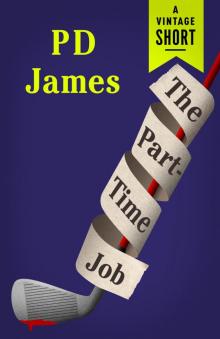 The Part-Time Job
The Part-Time Job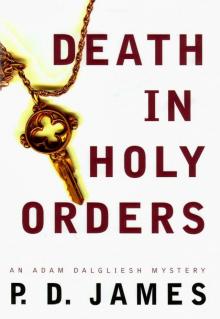 Death in Holy Orders
Death in Holy Orders The Victim
The Victim Shroud for a Nightingale
Shroud for a Nightingale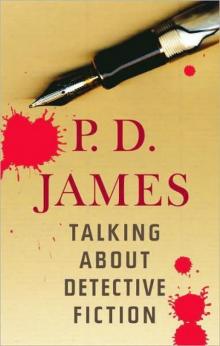 Talking about Detective Fiction
Talking about Detective Fiction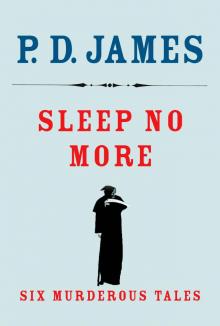 Sleep No More
Sleep No More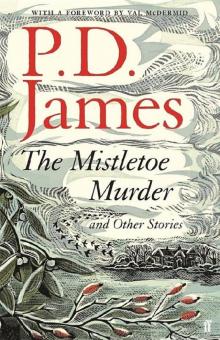 The Mistletoe Murder and Other Stories
The Mistletoe Murder and Other Stories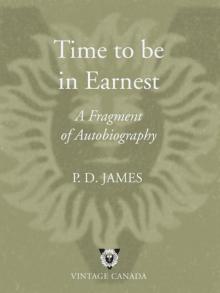 Time to Be in Earnest
Time to Be in Earnest Original Sin
Original Sin A Mind to Murder
A Mind to Murder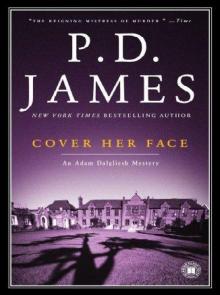 Cover Her Face
Cover Her Face Innocent Blood
Innocent Blood Devices and Desires
Devices and Desires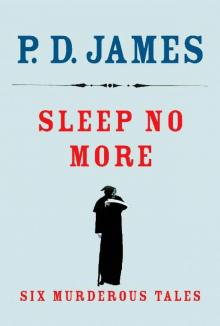 Sleep No More: Six Murderous Tales
Sleep No More: Six Murderous Tales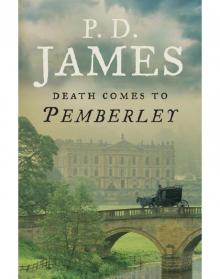 Death Comes to Pemberley
Death Comes to Pemberley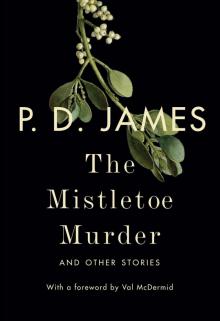 The Mistletoe Murder
The Mistletoe Murder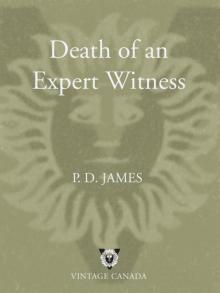 Death of an Expert Witness
Death of an Expert Witness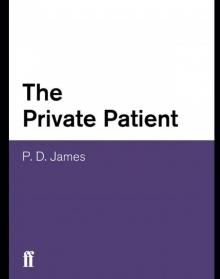 The Private Patient
The Private Patient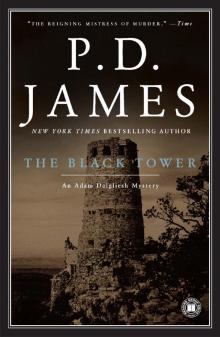 The Black Tower
The Black Tower Devices & Desires - Dalgleish 08
Devices & Desires - Dalgleish 08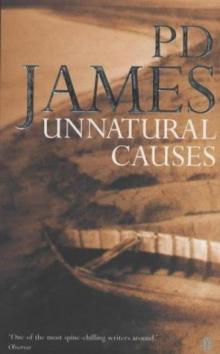 Unnatural Causes
Unnatural Causes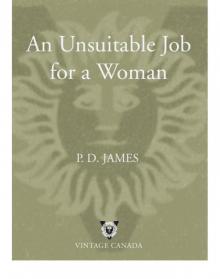 An Unsuitable Job for a Woman
An Unsuitable Job for a Woman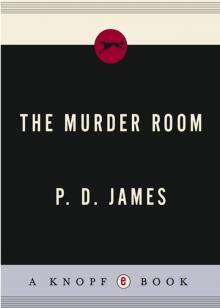 The Murder Room
The Murder Room A Certain Justice
A Certain Justice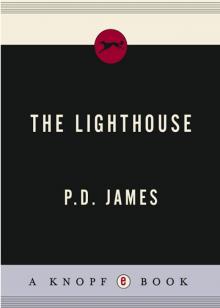 The Lighthouse
The Lighthouse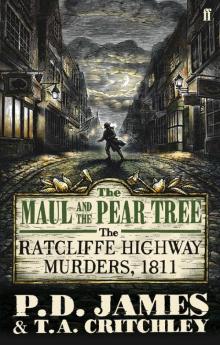 The Maul and the Pear Tree
The Maul and the Pear Tree